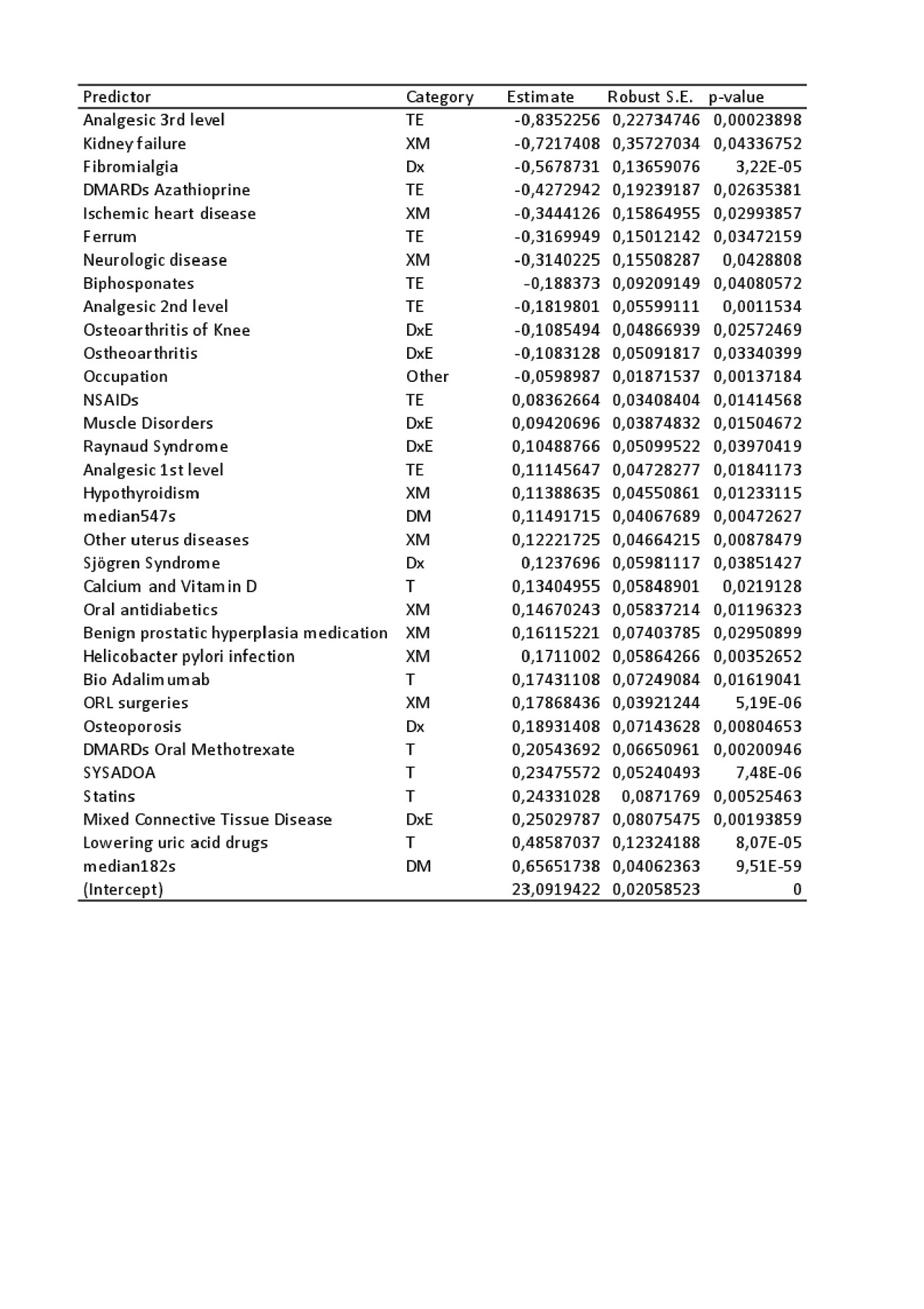Session Information
Session Type: Poster Session (Monday)
Session Time: 9:00AM-11:00AM
Background/Purpose: Musculoskeletal diseases (MSKs) are the major cause of disability, affecting the patient’s daily activities as well as their Quality of Life (QoL). Our objective is to analyze in a cohort of patients with MSKs the influence of demographic and clinical predictors in repeated measures of Health-Related QoL (HRQoL) obtained from a departamental electronic health record (EHR)
Methods: Patients attending the Hospital Clínico San Carlos rheumatology outpatient clinic (HCSC-MSK cohort) from April 1st, 2007 to November 30th, 2017 who were seen at least twice were included in this study. Our primary outcome was HRQoL collected in each patient’s visit using the Rosser Classification Index (it ranges between 0 and 1, the higher value, the higher HRQoL. It is calculated as the combination of two subscales: disability and distress). Demographic and clinical variables, such as diagnoses, treatments, and comorbidities were included as predictors. Variable selection was carried out in 4 steps. First, we developed a bivariate Generalized Estimating Equations model, selecting those variables with a p-value < 0.15. Second, those with a pair-wise absolute correlation < 0.95 were carried to the next step. Third, multivariate GEE analyses were performed including clinical related variables, and those independently associated with our primary outcome were selected with a p-value < 0.10. Finally, a Penalized GEE was implemented including all selected variables and using an independence correlation structure. Those with an estimate greater than 10^-3 and a p-value lower than 0.05 were considered to be independently associated with the HRQoL.
Results: A total of 19,299 patients with 101,649 outpatient visits were included in this study. From the initial 406 predictors, 290, 242, 139 were selected in the first, second and third steps (Figure 1). After multivariate PGEE analysis, 31 predictors independently associated with HRQoL were identified (Table 1). The predictors with a greater negative impact in HRQoL were the use of 3rd level analgesics and azathioprine, a pressence of kidney failure, fibromyalgia, and ischemic heart disease. Conversely, use of symptomatic slow action drugs for osteoarthritis, statins, lowering uric acid drugs, a diagnoses of mixed connective tissue disease, and better HRQoL in the past six months were independently associated with a positive impact in the HRQoL
Conclusion: We have identified several diagnoses, treatments and comorbidites independently associated with HRQoL in a cohort of patients followed up in a rheumatology outpatient clinic. This represent a first step in the implementation of value-based care for MSK patients, as we can now review the procedures associated with a worse HRQoL in an attempt to improve them.
To cite this abstract in AMA style:
Rodríguez-Rodríguez L, Madrid García A, Font Urgelles J, León L, Freites Nuñez D, Lajas C, Pato Cour E, Jover Jover J, Fernández Gutiérrez B, Abasolo Alcazar l. Predictors of Health-Related Quality of Life in Patients with Musculoskeletal Diseases: A Longitudinal Analysis from an Electronic Health Record Database [abstract]. Arthritis Rheumatol. 2019; 71 (suppl 10). https://acrabstracts.org/abstract/predictors-of-health-related-quality-of-life-in-patients-with-musculoskeletal-diseases-a-longitudinal-analysis-from-an-electronic-health-record-database/. Accessed .« Back to 2019 ACR/ARP Annual Meeting
ACR Meeting Abstracts - https://acrabstracts.org/abstract/predictors-of-health-related-quality-of-life-in-patients-with-musculoskeletal-diseases-a-longitudinal-analysis-from-an-electronic-health-record-database/


